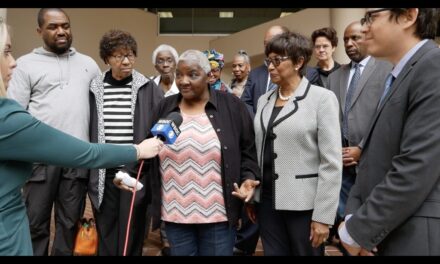By Rev. Dorothy S. Boulware
Word in Black
Six years ago, I was in Turks and Caicos celebrating my 50th wedding anniversary, walking the entire expanse of the resort and having a great time with the entire family — children, grands, and even great-grands. I had no thought of infirmity of any type. Nothing was slowing me down.
By 2021, both hips needed surgery, but it was considered cosmetic and had to wait. In the interim, we tried physical therapy and injections. Neither worked. So, in March 2022, I went in for what was to be a typical hip replacement, and the plan was that six weeks later, I’d have another typical hip replacement and get on with my life. Not so much.

It’s 2024. I’m walking with a cane, and I’m grieving the mobility I enjoyed until then. Although I’ve lost too many friends too soon, I chose to mention this loss because it’s often overlooked when we think about grief.
Grief is all around us. We grieve individually, and we grieve collectively. And it’s compounded by our shared social media culture.
So, what do we do with all this grief?
I spoke with my favorite counseling psychologist, Toni Boulware Stackhouse, who started her practice, Life Matters Wellness, in 2020 during the pandemic when people were going stir-crazy from being locked up with too many relatives in too little space.
Challenging the Prosperity Gospel
In response to my question of how the church can be more helpful in the grief process, our conversation immediately went to the “prosperity gospel,” which seems t
o suggest, depending on the teacher, that anyone who is on firm ground in their faith should have everything they need and want, and not hurt, be ill, or suffer loss of any kind. She said that’s the problem.
“One of the things the church can do is be more realistic about the fact that loss and death are parts of life. As much as there will be birth, there will be death. It’s the cycle of life. And that doesn’t speak to people dying prematurely, or prematurely in our sight,” Stackhouse says. “I think the thing with the church is we try to over-spiritualize some things. And we try to make people feel like, in a lot of instances, if you can’t accept things, if you feel like you gotta grieve, or you feel sad, or depressed, or you are anxious, then you are not spiritually mature. Or something is wrong with you. And that’s not true.”
She often references for her clients the scripture that details Jesus’ walk toward the hill of his death and describes him as being exceedingly sorrowful.
“So when we go through, we use cliches like, ‘I’m blessed and highly favored,’ rather than tell the truth that we’re devastated or in pain. What we have created in the culture of the church is that it’s not OK for you to be not OK, and we need to reverse that,” she says. “The church needs to be the place where we can be and feel whatever we need in that season.
“That speaks to the humanity of Jesus because he came to walk the earth so that he could be an example for us, right? And show us that it’s okay to be human. He knew what he was going to do. He still felt the grief of the process. And the Bible describes it as exceedingly sorrowful. Those words sound like depression, right?”
Many of Stackhouse’s clients come for more specific situations only to discover the real problem is grief. For those who find grief to be their current reality, she suggests tools to help get through.
“I tell people to make space for it. When you feel like you need to cry, cry. If you feel like screaming, cussing, whatever it is that you feel like doing, allow yourself to do it because that means you need that release from your body. Grief has stages, and grief also has moments — unpredictable moments,” Stackhouse says.
“Journaling is good, voice or writing. Find ways to keep the legacy or memory of the person, especially for the younger ones in the family. Take up a craft or a hobby of the loved one you’ve lost and keep it going,” she says. “If the person was a gift giver, then give the same kinds of gifts.”
She also encourages people to talk about their loved ones and share memories with those who are also experiencing the loss, allowing them to do the same.
The Weight of Youthful Grief
Rev. Therm James Jr. ministers to the “cradle to college” crew — between 150 and 175 young people at his church, New Macedonia Baptist Church, in Southeast Washington, D.C. In addition to his gifts and extensive professional training on the subject of grief, this doctoral student is, unfortunately, an expert.
When he was 13, his mother was killed in an automobile accident, and he went through all the expected stages of grief. He argued with God and questioned God’s keeping people addicted to and abusing drugs but taking his mother, “who was always singing and shouting, praising and living a good life.”
He was taken aback when one of his young men said, “Pastor TJ, all this stuff you’re talking about growing up, but who says I’m going to grow up?”
“And it hit me in a different way, hearing ‘I’m not going to be here for a long time, so let me just have a good time,’” he says. “With all the loss they’ve experienced, they raise the question, ‘Who’s to say I’m not next?’”
James says we used to have to pick up the paper to find out what was going on. “But now, every day you’re on your phone, you’re checking out Murder Ink, which houses all the bad things that happen in Baltimore City.”
He says every so often, he just has to disconnect from it.
Faith in the Midst of Loss
“I see people who look like me, who have murdered people who look like me, and it plays on my emotions. It’s not normal. What we’re trying to make normal is just not normal,” James said, mentioning a recent Bible study on the theodicy of God, when bad things happen to good people. Or what happens when everything goes wrong.
“Job did everything right, and everything went wrong,” he says. “I try to help them understand we just can’t understand God, but that it’s alright to be angry with God. Faith will sustain you, but it always doesn’t feel fair.”
James’ bottom line is, “It’s OK to be angry with God, but just don’t stop talking.”
This article was originally published on WordinBlack.com.
The post Grief hits hard, even for the faithful appeared first on AFRO American Newspapers.











